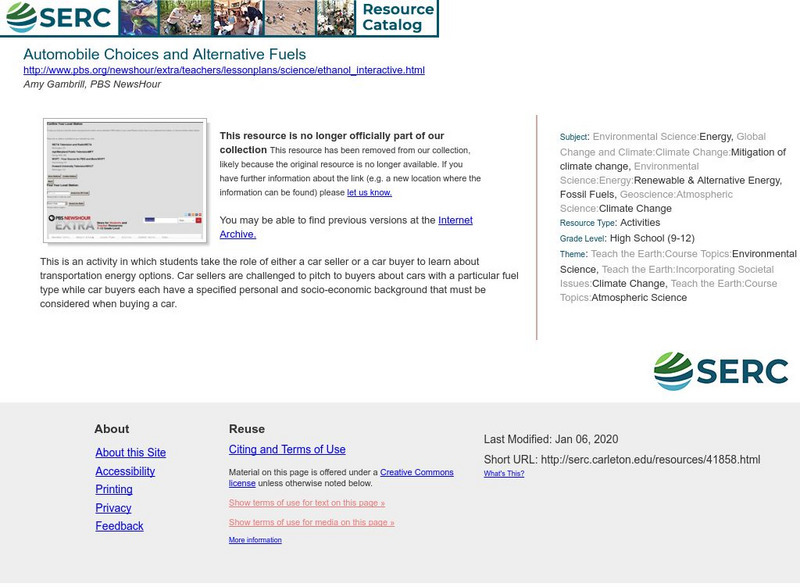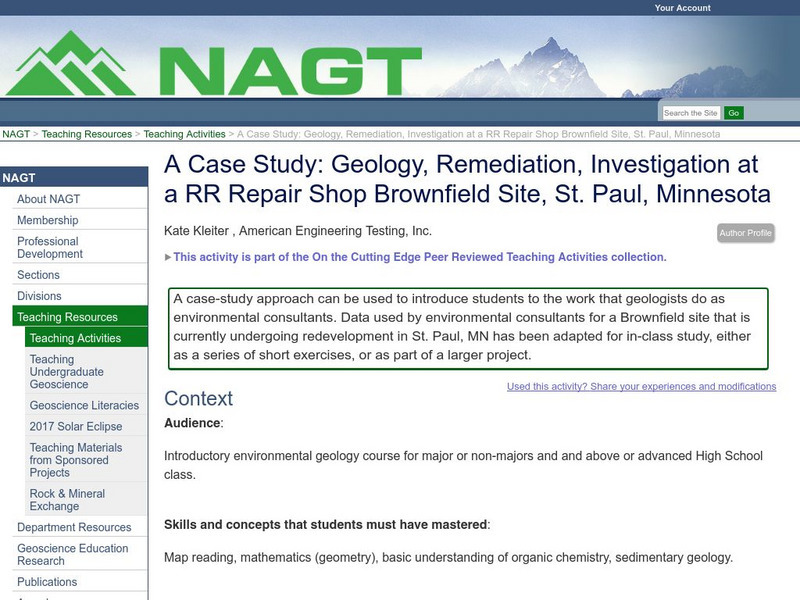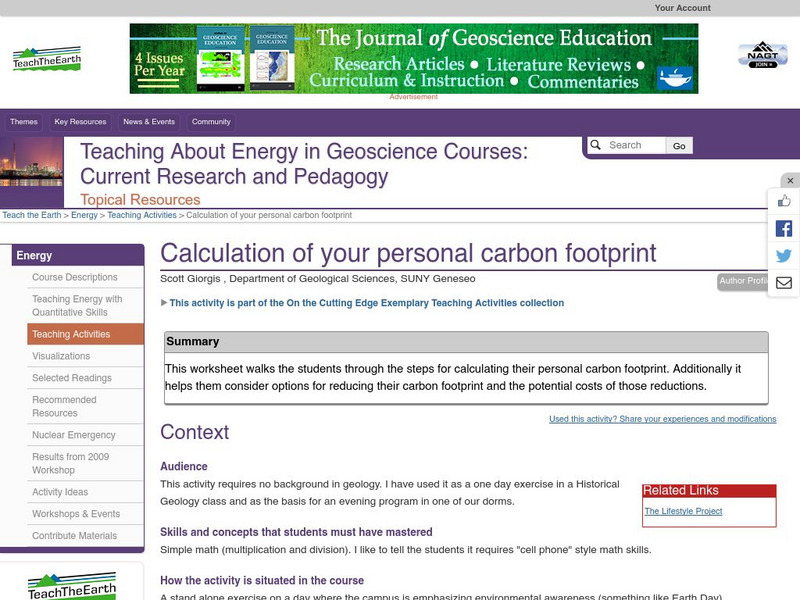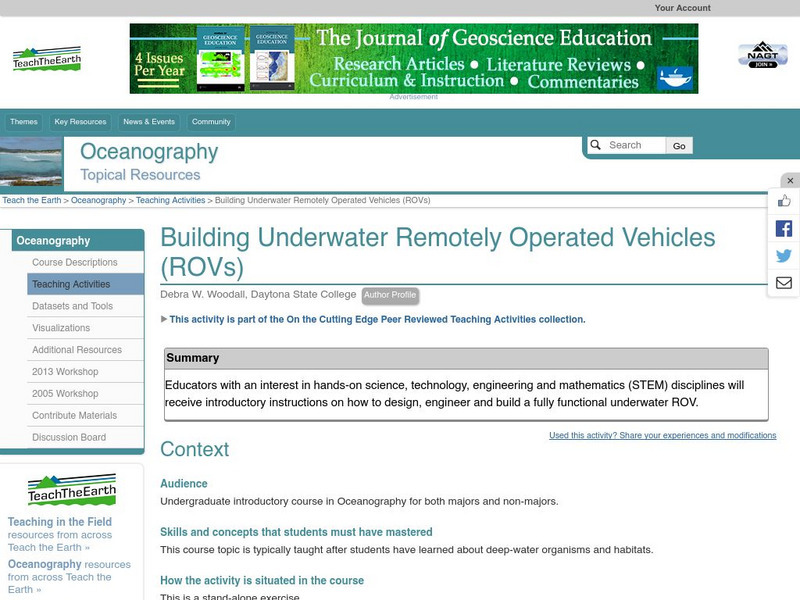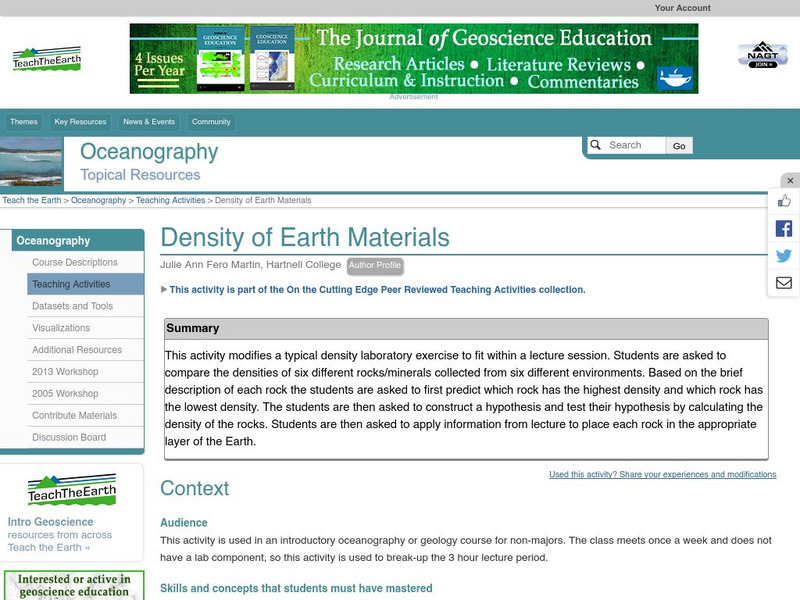Climate Literacy
Clean: Bering Sea Expedition
In this investigation learners research the effects of melting sea ice in the Bering Sea Ecosystem. They create research proposals to earn a place on the scientific research vessel Healy and present their findings and proposals to a...
Climate Literacy
Clean: It's Time to Tell the Story About Buds, Leaves and Global Warming
In this activity, students explore how, in New England, the timing of color change and leaf drop of deciduous trees is changing.
Climate Literacy
Clean: A Global Issue: The Impacts of Climate Change
This is lesson five of a 9-lesson module. Activity explores the effects of climate change on different parts of the Earth system and on human well-being: polar regions, coral reefs, disease vectors, extreme weather, and biodiversity.
Science Education Resource Center at Carleton College
Serc: Automobile Choices and Alternative Fuels
This is an activity in which students take the role of either a car seller or a car buyer to learn about transportation energy options. Car sellers are challenged to pitch to buyers about cars with a particular fuel type while car buyers...
Science Education Resource Center at Carleton College
Serc: A Reader's Guide to Climate Change
In this activity from the Deep Earth Academy, students divide into groups to read and discuss one of nine short articles (1-2 pages) about research done by the Ocean Drilling Program. These articles discuss our understanding about past...
American Museum of Natural History
American Museum of Natural History: Amazing Albedo
This lesson is a lab in which students use thermometers, white and dark paper, and lamps to measure differences in albedo between the light and dark materials. Connections are made to albedo in Antarctica.
US Department of Energy
United States Department of Energy: Biomass Investigating Gases
In this lab activity students generate their own biomass gases by heating wood pellets or wood splints in a test tube. They collect the resulting gases and use the gas to roast a marshmallow. Students also evaluate which biomass fuel is...
National Association of Geoscience Teachers
Nagt.org: A Kinesthetic Demonstration for Locating Earthquake Epicenters
A kinesthetic activity for students to understand the technique for locating the epicenter of an earthquake. It is performed indoors and outdoors in three lessons.
National Association of Geoscience Teachers
Nagt.org:geology, Remediation, Investigation at a Rr Repair Shop Brownfield Site
A case-study approach can be used to introduce students to the work that geologists do as environmental consultants. Data used by environmental consultants for a Brownfield site that is currently undergoing redevelopment in St. Paul, MN...
National Association of Geoscience Teachers
Nagt.org: A Remote Access System for Education
In 2003, the University of Minnesota's Electron Microprobe Laboratory implemented a new system for remote research and education via the Internet. The remote-access system allows real-time access to our microprobe using only standard web...
Science Education Resource Center at Carleton College
Serc: Fire and Ice: Volcanic and Glacial Features on Land and Seafloor
Students learn about glacial and volcanic features by examining and comparing bathymetric and topographic images of the Sand Point area of Alaska.
Science Education Resource Center at Carleton College
Serc: Are Nanobacteria Alive: Sample Socratic Questions
Questions regarding the characteristics of life, with emphasis on nanobacteria, are arranged in sequence for Socratic questioning.
Science Education Resource Center at Carleton College
Serc: Bioinformatics
This exercise contains two interrelated modules that introduce students to modern biological techniques in the area of Bioinformatics, which is the application of computer technology to the management of biological information. The need...
Science Education Resource Center at Carleton College
Serc: Carbon Footprint Exercise
A three-step assignment for students in introductory geoscience that asks them to calculate their carbon footprint during one specific week. The goal of the assignment is to increase student awareness of the various sources of energy...
Science Education Resource Center at Carleton College
Serc: Do You Really Want to Visit the Arctic?
This jigsaw activity is designed for students to become familiar with several datasets of Arctic weather data, collected in Eureka on Ellesmere Island. Students join a role-playing activity to read and interpret graphs while considering...
Science Education Resource Center at Carleton College
Serc: Arctic Climate Curriculum, Activity 3: Exploring Arctic Climate Data
Learners dig into authentic Arctic climate data to unravel some causes and effects related to the seasonal melting of the snowpack. In particular, students learn about albedo and its relationship to snowmelt. This concept applied to...
Science Education Resource Center at Carleton College
Serc: Arctic Climate Curriculum, Activity 1: Exploring the Arctic
This activity introduces students to the Arctic, including different definitions of the Arctic and exploration of the Arctic environment and Arctic people. Students set out on a virtual exploration of the geography of the Arctic using...
Science Education Resource Center at Carleton College
Serc: Boomburbs
A boomburb is a new urban phenomena that has emerged in the last 20 years along with the growth of the Sunbelt and its suburban-dominated forms of urbanization. Boomburbs are rapidly growing suburban cities and represent a new...
Science Education Resource Center at Carleton College
Serc: Calculation of Your Personal Carbon Footprint
This worksheet walks the students through the steps for calculating their personal carbon footprint. Additionally it helps them consider options for reducing their carbon footprint and the potential costs of those reductions.
Science Education Resource Center at Carleton College
Serc: Case Study: Zhouqu, China Landslide
This is a 'citizen science' research project where students to apply their knowledge of landslide processes in an investigation of the natural and anthropogenic causes of a real-world landslide catastrophe. Students produce a 'magazine'...
Science Education Resource Center at Carleton College
Serc: Challenging Pre Conceptions
Students carry into class pre-conceptions based on stories they've heard, articles they've read and experiences they've had. One of the best opportunities to teach metacognition is at a 'gotcha' moment when they come to realize their...
Science Education Resource Center at Carleton College
Serc: Building Underwater Remotely Operated Vehicles (Ro Vs)
Educators with an interest in hands-on science, technology, engineering and mathematics (STEM) disciplines will receive introductory instructions on how to design, engineer and build a fully functional underwater ROV.
Science Education Resource Center at Carleton College
Serc: Density of Earth Materials
Students compare the densities of six different rocks/minerals collected from different environments, and then predict which rocks have the highest and lowest densities. Then they construct and test their hypothesis by calculating the...
Science Education Resource Center at Carleton College
Serc: Animal Rights and Welfare
The relationship of animals and humans has been the subject of differing philosophical views for thousands of years. The controversy continues today in many aspects of contemporary life. Some people believe that a vegan lifestyle is the...





